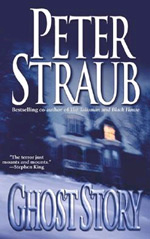
![]() verkisto
verkisto
7/26/2016
![]()
As evidenced by my recent journey into Piers Anthony, I've been on a bit of a kick lately of wanting to re-read stuff that I really liked when I was younger. I'm not sure what's driving it, but over the last weekend, I decided I wanted to re-read some of my favorite horror novels, too. First up on that list is Ghost Story, which takes the credit for being the only horror novel I ever read that creeped me out so much that I literally slept with the light on one night. This read marks at least the third time I've read Ghost Story (I can't remember how many times I read it as a teen, but this is the second time I've read it as an adult), and while the scene didn't creep me out as much as it did that first time, I still found it to be effective. In fact, I found the entire novel to be wildly effective, so much so that I raised my Goodreads rating from four stars to five. It's just that good.
I'm not sure what exactly makes it so damned effective. There are stories within stories within stories here, and each one is related in one way or another to all the rest, which means that all the stories drive the main plot. The cast of Ghost Story is huge: there are five main characters, three of which are the principle characters; in addition to them, there are at least a couple dozen other characters who populate the town in which the story takes place, and Straub takes the time to develop them just enough to make us feel how he wants us to feel about them. Some of the characters are only tertiary, and don't have a lot of time devoted to their development, but they still come across as individuals, and not carbon copies of other characters or cliches. Oftentimes, Straub covers the lives of these characters in one small section that separates the action, seemingly glossing over these lives, but he manages to capture a lot of detail about the characters and give them more to do than just serve as supporting cast members. Plus, the town itself is a principle part of the story and could almost be a character in and of itself. Milburn's location, history, layout, and weather are all central to the story, and Straub pays as much attention to developing Milburn as he does the rest of his cast.
The book has an overall spooky, pensive feel, and the dread grows throughout the telling of the tale. The situation gets more and more dire, and the menace of the antagonist gets more and more pervasive. As the events get worse, so does the weather; Milburn is seeing the worst winter in decades, and the isolation of the town and its residents adds to the horror, and in fact drives it to some degree. The plot centers around the so-called Chowder Society, a group of four friends who started getting together to tell ghost stories after the death of a good friend of theirs, and a dark history that's about to catch up with them. The stories that the friends tell one another are all inter-related, and are, in fact, related to the bigger story of their history together. They're not just entertaining each other; they're girding each other for battle, though they don't even realize that there's a battle to be had until they bring in a fifth member to their group. But even that fifth member has a connection to the vengeance that's coming.
Ghost Story just might be the second-best horror novel I've ever read (The Haunting of Hill House still takes that prize for me), and I feel like I can appreciate it better now than I did when I first read it as a teen. Back then, more than anything else, I remembered that one scene that spooked me so well; now, I can appreciate it for its literary references, its slow build-up, and its overall atmosphere of dread. If anyone wants to read a perfect example of a horror novel, Ghost Story would be as good a place to start as any.